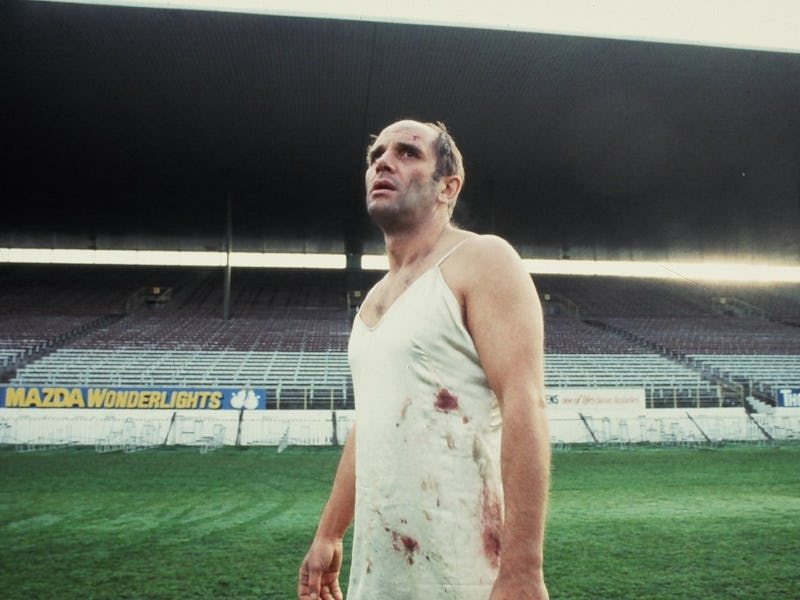There Are No Monsters In The Most Underrated Post-Apocalyptic Movie
Not even man.

It’s difficult to think of the post-apocalyptic genre without picturing zombies, fungus monsters that act exactly like zombies, or barbarians whose insatiable rampages make them, for all intents and purposes, zombies. Such stories are often thin excuses to concoct grim displays of bloodshed and amateur philosophy: most of humanity gets infected or goes mad without civilization’s guardrails, so our heroes can blow away the bandits and cannibals guilt-free.
Maybe, though, we might just get along, or at least quibble no more than we do already. So suggests The Quiet Earth, which hit American theaters 40 years ago today and begins with middle-aged scientist Zac Hobson (Bruno Lawrence, who also co-wrote) waking to find himself all alone. There aren’t even bodies; everyone else is simply gone, whisked away mid-breakfast as though only Hobson wasn’t invited to the Rapture.
The first act is a darkly comic look at life as the last man, as Zac veers between responsibly hunting for survivors and supplies, acting out fantasies of looting malls and living like a king, and sitting around with a shotgun in his mouth. A cog in a vague global initiative called Project Flashlight, Zac fears that his work had something to do with “the event” that’s erased even the Earth’s animals, and that for his sins he’s been “condemned to live.” By the time he’s giving a fiery speech to cardboard cutouts of Hitler and the Pope, you’ll be convinced that the apocalyptic novelty of shedding all responsibilities would wear off in a hurry.
But survivors eventually emerge, and a love triangle comes with them. Zac meets Joanne (Alison Routledge), then Api (Pete Smith), and while both introduce themselves by holding him at gunpoint, passionate hugs soon follow. Zac and Joanne become lovers — being the only people around is certainly more effective than app-based dating — but there are sparks between Joanne and Api too. Api and Zac, for their part, tend to butt heads about who’s in charge; neither is a bad person, but three, after all, is company.
Nothing says classic meet cute like the end of all things.
As the trio tries to navigate the foibles of human emotion, a problem larger than their collective libidos appears. The universe’s once-trusty physical constants are changing, and the sun’s behavior is becoming erratic. If Flashlight isn’t destroyed, then the Earth will go up in smoke, and no one will be scoring anymore. The science is a bit silly, but it’s enough to get our heroes working towards a fix, and a surprise ending that will leave you wondering after the credits roll.
A New Zealand production officially based on a Craig Harrison novel, and unofficially a remake of 1959’s racially-tinged The World, the Flesh and the Devil (with Api, a Māori man, subbing in for Harry Belafonte’s African-American lead), A Quiet Earth is a dreamy, even serene apocalypse with nary a monster or conquering robot in sight. With no threats to face, Zac’s mental state — portrayed with Lawrence’s convincing range — responds to circumstance. Alone, the stoic we’re introduced to descends into guilt-ridden mania. Joanne keeps him focused, even content. When Api enters the picture, his ups and downs make him a man with a full range of emotions that wouldn’t be out of place in the pre-apocalyptic world.
Even the apocalypse isn’t immune to the troubles of love and race.
There’s no drama here about a grizzled group of survivors arguing over their dwindling resources or wondering if there’s a traitor in their midst. And with everything they could ever need at their fingertips, our threesome is free to futz around on the piano and debate whether they’ve found themselves in purgatory. It’s a low-key, humanist take on the end times; our survivors aren’t those best able to slaughter their fellow man, merely chance benefactors of cosmic circumstance.
The question looming over so much post-apocalyptic fiction is what you would do if you had nothing to do beyond fulfill your base needs; if you had no job to show up for and no laws to obey. It can be a fantasy or a commentary, ultimate freedom or a descent into debauchery. In The Quiet Earth, it just is. Even in a world where seemingly nothing matters, we will both seek out community and be exasperated by it.
Whatever conclusion you reach about The Quiet Earth’s infamous ending, watching it after nearly a half-century of bleak post-apocalyptic survival stories feels like a panacea. When the end times come, maybe we don’t have to fall into anarchy and destruction. Maybe, as is so often the case, we’ll just be.